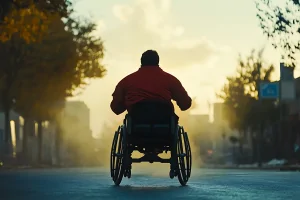Sleep apnea is one of the most common conditions among veterans, yet it is also one of the most frequently denied disability claims by the Department of Veterans Affairs (VA). If you’ve filed a claim for sleep apnea and received a denial letter, you are not alone. Many veterans face this frustrating outcome, even when their symptoms are severe and well-documented.
To understand why these denials happen, it’s important to first look at what sleep apnea is, why it disproportionately affects veterans, and what the VA requires before granting benefits. Leah will break down the top five reasons VA denies sleep apnea claims and what you can do to strengthen your case.

Understanding Sleep Apnea
Sleep apnea is a sleep disorder where breathing repeatedly stops and starts during rest. There are three main types:
- Obstructive sleep apnea (OSA): The most common form, caused by the airway collapsing during sleep.
- Central sleep apnea: The brain fails to send proper signals to the muscles that control breathing.
- Mixed sleep apnea: A combination of obstructive and central types.
Symptoms include loud snoring, choking or gasping during sleep, and extreme daytime fatigue. Beyond tiredness, untreated sleep apnea can increase the risk of high blood pressure, heart disease, diabetes, and stroke.
Why Veterans Face Higher Risk
Studies consistently show that veterans are far more likely to develop sleep apnea than the general population. A 2014 study in the Journal of Clinical Sleep Medicine revealed that nearly 60% of post-9/11 veterans screened were at high risk. Another VA report found that more than one in five veterans receiving VA care already had a sleep apnea diagnosis.
PTSD is a major factor. Research shows that 70 to 90% of veterans with PTSD symptoms also screen positive for sleep apnea. Additional military-related risk factors include:
- Irregular sleep schedules during deployment
- Exposure to dust, chemicals, and burn pits
- Weight gain from stress and medications
- Traumatic brain injuries (TBI)
- Long-term effects of combat stress
These unique circumstances make veterans more vulnerable, but increased risk does not automatically translate into an approved VA claim. That’s where many run into trouble.
Primary vs. Secondary Service Connection
For VA disability claims, sleep apnea can be service-connected in two ways:
- Primary service connection – Sleep apnea began during service. Evidence could include medical records, documented snoring, fatigue complaints, or an in-service sleep study.
- Secondary service connection – Sleep apnea developed as a result of another service-connected condition. Common examples include PTSD, GERD, hypertension, TBI, or weight gain caused by medication for another condition.
Failing to establish which type of service connection applies is one of the biggest pitfalls veterans encounter when filing a claim.
Top 5 Reasons VA Denies Sleep Apnea Claims
1. No Official Sleep Study
The VA requires a formal diagnosis, usually through a sleep study known as a polysomnogram. Without one, the VA will not recognize the condition for rating purposes. While home tests are sometimes accepted, the strongest evidence comes from a lab-based study. Simply reporting symptoms such as snoring or fatigue isn’t enough without this medical confirmation.
2. Lack of Service Connection Evidence
Even if you have a confirmed diagnosis today, the VA wants proof linking it to your military service. Many veterans assume that because the VA diagnosed them with sleep apnea after retirement, it should automatically be covered. Unfortunately, that is not the case.
If your sleep apnea was first diagnosed years after leaving the service, you must show how it connects to your military duties, exposures, or another service-connected condition. Without that link, known as a “nexus,” the claim is likely to be denied.
3. Weak or Missing Nexus Opinion
A nexus is a medical opinion that explains how your sleep apnea is at least as likely as not caused or aggravated by your service. If your Compensation and Pension (C&P) examiner provides a negative nexus—such as attributing your condition to obesity or age instead of service—the VA adjudicator may deny the claim.
This is where private medical opinions can make a difference. A doctor who reviews your records and provides a detailed rationale linking your condition to service can strengthen your case. Supporting medical literature, buddy statements, and spousal testimony about observed symptoms during service can also help.
4. Other Risk Factors Overlook Service Impact
The VA often attributes sleep apnea to non-service factors, such as:
- Obesity unrelated to service
- Age-related airway changes
- Anatomical issues like a deviated septum
- Male gender, which carries a higher risk
While these factors may contribute, they do not necessarily rule out a service connection. For example, if weight gain was caused by medications prescribed for a service-connected condition, then obesity may actually serve as a link rather than a barrier. Veterans often need strong evidence and professional guidance to clarify these distinctions.
5. Misunderstanding of the Rating System
Even when service connection is granted, confusion about the VA rating system can lead to disputes. Currently, a 50% rating requires documented use of a CPAP or other breathing assistance device. If your doctor does not prescribe one, you may only qualify for a 30% rating, regardless of how severe your symptoms feel.
Some veterans mistakenly believe that not using the prescribed device will hurt their claim. In reality, the requirement is about medical necessity, not compliance. Understanding the rating criteria can help set realistic expectations and avoid misunderstandings that might delay or derail your case.
Strengthening Your Sleep Apnea Claim
While VA denials are common, they are not the end of the road. Veterans can take several steps to improve their chances of success:
- Get an official sleep study and diagnosis.
- Gather buddy statements from fellow service members or spouses who witnessed symptoms.
- Seek a nexus opinion from a qualified medical professional.
- Collect supporting medical literature linking sleep apnea to conditions like PTSD or TBI.
- Work with an accredited VA attorney, claims agent, or Veterans Service Officer (VSO) for appeals.
The Appeals Modernization Act provides multiple paths for challenging a denial, including supplemental claims with new evidence, higher-level reviews, and direct appeals to the Board of Veterans’ Appeals.
Conclusion
Sleep apnea is a serious health condition that affects a large number of veterans, but the VA frequently denies claims due to missing evidence, weak nexus opinions, or misunderstanding of service connection rules. By knowing what the VA looks for and preparing strong supporting evidence, veterans can significantly improve their chances of receiving the benefits they deserve.
If your claim has been denied, don’t give up. With the right medical documentation, professional guidance, and persistence, you can fight back and potentially overturn the decision.
Also read: Hepatitis and VA Disability
At Prestige Veteran Medical Consulting, a veteran-owned company, we specialize in Independent Medical Opinions (IMOs) known as Nexus letters.
Our purpose is to empower YOU, the veteran, to take charge of your medical evidence and provide you with valuable educational tools and research to guide you on your journey.
Understanding the unique challenges veterans face, our commitment lies in delivering exceptional service and support.
Leveraging an extensive network of licensed independent medical professionals, all well-versed in the medical professional aspects of the VA claims process, we review the necessary medical evidence to incorporate in our reports related to your VA Disability Claim.
Prestige Veteran Medical Consulting is not a law firm, accredited claims agent, or affiliated with the Veterans Administration or Veterans Services Organizations. However, we are happy to discuss your case with your accredited VA legal professional.















